英语人教版六年级下册重点单词句子
六年级英语下册重点词组、句子

六年级下册英语重点词组和句子Lesson 51、砍倒cut down2、净化空气make the air clean3、从植物中获取食物get food from plants4、通过空气、水和阳光制造食物make food from air , water and sunlight5、防止水分流失keep the water from flowing away6、阻止风刮起沙土stop the wind from blowing up sand and earth7、在一些地方in some places8、他们将会尽最大努力保护树木。
They will do their best to protect trees .9、我们的国家将会更美丽。
Our country will be more beautiful .10、引起洪灾和沙尘暴bring about floods and sandstorms11、明天几号?What’s the date tomorrow ?= What’s tomorrow’s date ?3月12号. It’s March 12th .12、你们在植树节干什么?What do you do on Tree Planting Day ?我们种树。
We plant trees .13、你们在哪里种树?Where will you plant trees ?在我们学校后面的小山上。
On the hills behind our school . 14、你愿意加入我们吗?Would you like to join us ?是的,我愿意。
Yes , I’d like to .15、我们几点出发?What time will we go ? 在8点。
At eight .16、植物对人们很重要。
Plants are very important to people .17、少了植物,生命将无法延续。
人教pep版六年级下册英语全册重要知识点总结

人教pep版六年级下册第一单元单元重要知识点总结四会单词:tall—taller更高的short—shorter 更矮的strong—stronger更强壮的small—smaller (体型)更小的old—older 年龄更大的young—younger 更年轻的big—bigger更大的heavy—heavier 更重的long—longer 更长的thin—thinner 更瘦的四会句型:How tall are you? 你有多高?I’m 164 cm tall. 我164 厘米高。
You’re shorter than me. 你比我矮。
You’re 4 cm taller than me.你比我高4厘米。
How heavy are you? 你有多重?I’m 48 kg. 我48千克。
应该掌握的知识点:1.表示两者之间有所比较时,句子中的形容词要用比较级形式。
形容词变为比较级的变化规则:(1)一般情况下,在形容词的词尾直接加er。
如: tall—taller short—shorter.(2)以字母e结尾的形容词,在词尾直接加r,如:nice—nicer late—later(3)以重读闭音节结尾,且结尾只有一个辅音字母的词,先双写这个辅音字母,再加er.如:big—bigger thin—thinner fat—fatter(4)以辅音字母加y结尾的双音节形容词,先变y为i , 再加er。
如:easy—easierheavy—heavier funny—funnier.形容词比较级的变化口诀:原级变为比较级,通常er加上去。
若是结尾辅元辅,辅音双写要牢记。
辅音加y结尾时,把y变i 是必须。
原级若以e结尾,直接加r不后悔。
2.部分形容词比较级的不规则变化:good—better well—better bad—worsebadly—worse many—more much—more little—less far—farther3.同义句:How tall are you?=What’s your height?How heavy are you?=What’s your weight?4.以How开头的问句(仅限小学阶段):How are you? 问身体状况。
新人教版小学英语六年级下册重点单词及句子
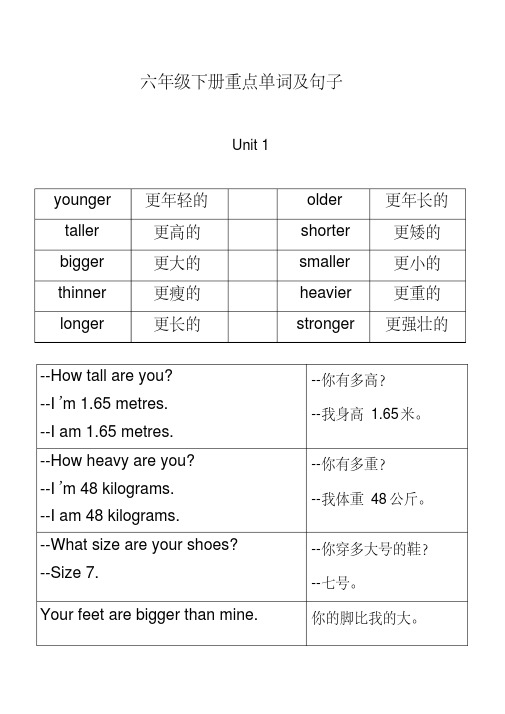
六年级下册重点单词及句子Unit 1younger 更年轻的older 更年长的taller 更高的shorter 更矮的bigger 更大的smaller 更小的thinner 更瘦的heavier 更重的longer 更长的stronger 更强壮的--How tall are you? --I’m 1.65 metres. --I am 1.65 metres. --你有多高?--我身高1.65米。
--How heavy are you? --I’m 48 kilograms.--I am 48 kilograms. --你有多重?--我体重48公斤。
--What size are your shoes? --Size 7. --你穿多大号的鞋?--七号。
Your feet are bigger than mine. 你的脚比我的大。
Unit 2X k B 1 . c o m(clean)cleaned my room 打扫房间(read)read a book 看书(wash)washed my clothes 洗衣服(see)saw a film 看电影(stay)stayed at home 待在家(have)had a cold 感冒(watch)watched TV 看电视(sleep)slept 睡觉last weekend 上周末yesterday 昨天last night 昨晚the day before yesterday last Monday 上周一前天--How was your weekend? --It was good, thank you.--你周末过得怎么样?--很好,谢谢。
--What did you do?--I stayed at home with your grandma. We drank tea in the afternoon and watched TV. http://w w w.xkb 1. com --你干什么了?--我和你奶奶待在家里。
最新人教版六年级英语下册各单元知识点总结归纳
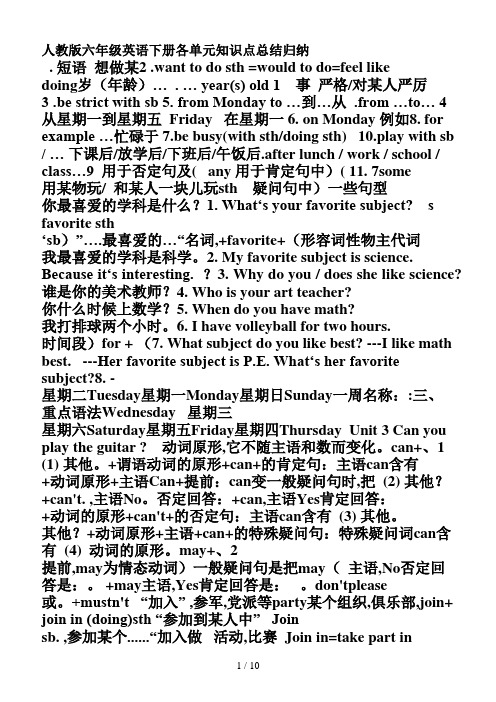
人教版六年级英语下册各单元知识点总结归纳. 短语想做某2 .want to do sth =would to do=feel likedoing岁(年龄)… . … year(s) old 1 事严格/对某人严厉3 .be strict with sb 5. from Monday to ...到...从 .from ...to (4)从星期一到星期五 Friday 在星期一 6. on Monday 例如8. for example …忙碌于 7.be busy(with sth/doing sth) 10.play with sb / … 下课后/放学后/下班后/午饭后.after lunch / work / school / class…9 用于否定句及( any 用于肯定句中)( 11. 7some用某物玩/ 和某人一块儿玩sth 疑问句中)一些句型你最喜爱的学科是什么?1. What‘s your favorite subject? s favorite sth‘sb)”….最喜爱的…“名词,+favorite+(形容词性物主代词我最喜爱的学科是科学。
2. My favorite subject is science. Because it‘s interesting. ?3. Why do you / does she like science? 谁是你的美术教师?4. Who is your art teacher?你什么时候上数学?5. When do you have math?我打排球两个小时。
6. I have volleyball for two hours.时间段)for + (7. What subject do you like best? ---I like math best. ---Her favorite subject is P.E. What‘s her favorite subject?8. -星期二Tuesday星期一Monday星期日Sunday一周名称::三、重点语法Wednesday 星期三星期六Saturday星期五Friday星期四Thursday Unit 3 Can you play the guitar ? 动词原形,它不随主语和数而变化。
Unit1Howtallareyou_默写版单词短语重点句子(知识清单)-人教PEP版英语六年级下册

六年级下册单词,重点词组和重点句子默写Unit 1重点单词1.更年轻的______________ 12. hall______________2.更年长的______________ 13. meter /metre______________3.更高的______________ 14. than______________4.更矮的______________ 15. both______________5.更长的______________ 16. kilogram______________6.更瘦的______________ 17. countryside______________7.更重的______________ 18. lower______________8.更大的______________ 19. shadow______________9.更小的______________ 20. bee______________10.更强壮的______________ 21. smarter______________11. dinosaur______________重点短语1.我们两个都______________ 8. what size______________2. over there______________ 9.那些鞋子______________3.多高______________ 10. heavier than me______________4.1.65 metres______________ 11.看一看______________5.多重______________ 12. the tallest dinosaur______________6.48 kilograms______________ 13.越来越低______________7.如此小______________ 14.越来越长______________重点句型1. 那是这个厅里最高的恐龙。
六年级下册英语重点单词句子

六年级下册英语重点单词句子一、重点单词。
1. younger [ˈjʌŋɡə(r)] 形容词(adj.),比较级形式,意为“更年轻的;更幼小的”。
2. older [ˈəʊldə(r)] 形容词(adj.),比较级形式,意为“更年长的;更旧的”。
3. taller [ˈtɔːlə(r)] 形容词(adj.),比较级形式,意为“更高的”。
4. shorter [ˈʃɔːtə(r)] 形容词(adj.),比较级形式,意为“更短的;更矮的”。
5. longer [ˈlɒŋɡə(r)] 形容词(adj.),比较级形式,意为“更长的”。
6. thinner [ˈθɪnə(r)] 形容词(adj.),比较级形式,意为“更瘦的”。
7. heavier [ˈheviə(r)] 形容词(adj.),比较级形式,意为“更重的”。
8. bigger [ˈbɪɡə(r)] 形容词(adj.),比较级形式,意为“更大的”。
9. smaller [ˈsmɔːlə(r)] 形容词(adj.),比较级形式,意为“更小的”。
10. stronger [ˈstrɒŋɡə(r)] 形容词(adj.),比较级形式,意为“更强壮的”。
11. yesterday [ˈjestədeɪ] 名词(n.),意为“昨天”。
12. last [lɑːst] 形容词(adj.),意为“上一个的;刚过去的”;也可作动词(v.),意为“持续”。
13. before [bɪˈfɔː(r)] 介词(prep.)/副词(adv.),意为“在……之前”。
14. hotel [həʊˈtel] 名词(n.),意为“旅馆”。
15. fixed [fɪkst] 动词(v.),fix的过去式,意为“修理;固定”。
16. broken [ˈbrəʊkən] 形容词(adj.),意为“破损的;弄坏了的”。
17. lamp [læmp] 名词(n.),意为“台灯”。
人教版六年级英语下册 重点句型语法总结
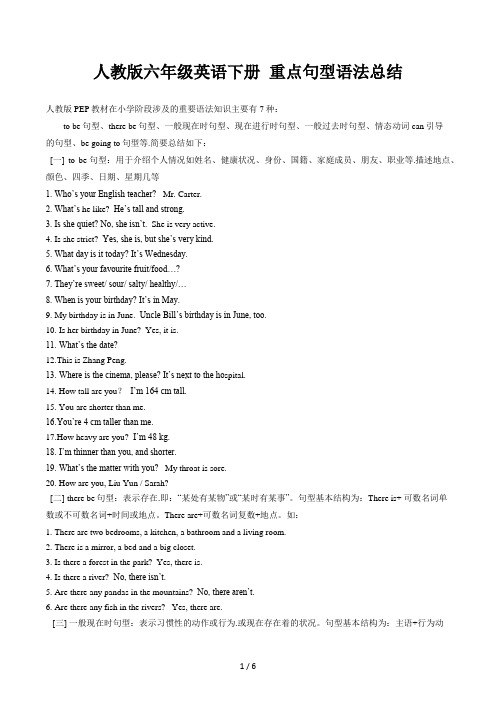
人教版六年级英语下册重点句型语法总结人教版PEP教材在小学阶段涉及的重要语法知识主要有7种:to be句型、there be句型、一般现在时句型、现在进行时句型、一般过去时句型、情态动词can引导的句型、be going to句型等.简要总结如下:[一] to be句型:用于介绍个人情况如姓名、健康状况、身份、国籍、家庭成员、朋友、职业等.描述地点、颜色、四季、日期、星期几等1. Who’s your English teacher? Mr. Carter.2. What’s he like? He’s tall and strong.3. Is she quiet? No, she isn’t. She is very active.4. Is she strict? Yes, she is, but she’s very kind.5. What day is it today? It’s Wednesday.6. What’s your favourite fruit/food…?7. They’re sweet/ sour/ salty/ healthy/…8. When is your birthday? It’s in May.9. My birthday is in June. Uncle Bill’s birthday is in June, too.10. Is her birthday in June? Yes, it is.11. What’s the date?12.This is Zhang Peng.13. Where is the cinema, please? It’s next to the ho spital.14. How tall are you?I’m 164 cm tall.15. You are shorter than me.16.You’re 4 cm taller than me.17.How heavy are you? I’m 48 kg.18. I’m thinner than you, and shorter.19. What’s the matter with you? My throat is sore.20. How are you, Liu Yun / Sarah?[二] there be句型:表示存在.即:“某处有某物”或“某时有某事”。
人教版六年级英语下册各单元必背词汇和句型
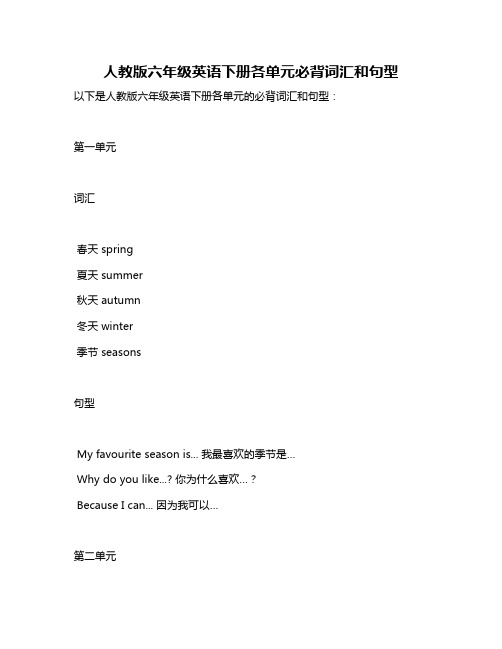
人教版六年级英语下册各单元必背词汇和句型以下是人教版六年级英语下册各单元的必背词汇和句型:第一单元词汇春天 spring夏天 summer秋天 autumn冬天 winter季节 seasons句型My favourite season is... 我最喜欢的季节是…Why do you like...? 你为什么喜欢…?Because I can... 因为我可以…第二单元词汇游泳 swim滑冰 skate放风筝 fly a kite堆雪人 make a snowman季节活动 seasonal activities句型What do you do in the...? 你在…做什么?I usually... 我通常…Do you often...? 你经常…吗?Yes, I do. / No, I don’t. 是的,我经常。
/ 不,我不经常。
第三单元词汇星期一 Monday星期二 Tuesday星期三 Wednesday星期四 Thursday星期五 Friday星期六 Saturday星期日 Sunday星期 weekdays星期天 weekends句型What do you have on...? 你星期几有什么课?I have... 我星期几有…课。
When do you have...? 你什么时候有…课? I have... on... 我在星期几有…课。
第四单元词汇电影 movies公园 parks图书馆 libraries博物馆 museums商店 shops饭店 restaurants医院 hospitals学校 schools银行 banks邮局 post offices公共场所 public places 句型。
六年级下册英语书笔记人教版
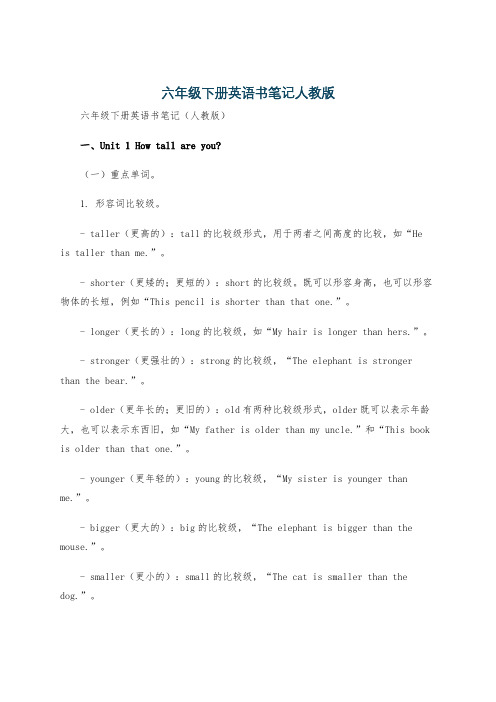
六年级下册英语书笔记人教版六年级下册英语书笔记(人教版)一、Unit 1 How tall are you?(一)重点单词。
1. 形容词比较级。
- taller(更高的):tall的比较级形式,用于两者之间高度的比较,如“He is taller than me.”。
- shorter(更矮的;更短的):short的比较级。
既可以形容身高,也可以形容物体的长短,例如“This pencil is shorter than that one.”。
- longer(更长的):long的比较级,如“My hair is longer than hers.”。
- stronger(更强壮的):strong的比较级,“The elephant is stronger than the bear.”。
- older(更年长的;更旧的):old有两种比较级形式,older既可以表示年龄大,也可以表示东西旧,如“My father is older than my uncle.”和“This book is older than that one.”。
- younger(更年轻的):young的比较级,“My sister is younger than me.”。
- bigger(更大的):big的比较级,“The elephant is bigger than the mouse.”。
- smaller(更小的):small的比较级,“The cat is smaller than the dog.”。
- thinner(更瘦的):thin的比较级,“She is thinner than her sister.”。
2. 其他重点单词。
- centimeter(厘米):长度单位,缩写为“cm”,例如“I am 150 centimeters tall.”。
- meter(米):长度单位,缩写为“m”,“The building is 50 meters high.”。
六年级下册英语重点单词归纳

六年级下册英语重点单词归纳Unit 1: Food单元一:食物1. fruit (水果) - Apples, oranges, bananas, and grapes are examples of fruits.2. vegetable (蔬菜) - Carrots, broccoli, and spinach are examples of vegetables.3. rice (米饭) - Rice is a staple food in many countries.4. bread (面包) - Bread is made from flour, water, and yeast.5. meat (肉类) - Chicken, beef, and pork are examples of meat.6. fish (鱼) - Salmon, tuna, and cod are examples of fish.7. milk (牛奶) - Milk is a common beverage that comes from cows.8. cheese (奶酪) - Cheese is made from milk and is often used as a topping or ingredient in dishes.9. yogurt (酸奶) - Yogurt is a fermented dairy product that is often consumed for its health benefits.10. egg (鸡蛋) - Eggs are commonly used in cooking and baking.11. cake (蛋糕) - Cake is a sweet dessert made from flour, sugar, and eggs.12. ice cream (冰激凌) - Ice cream is a frozen dessert that comes in many flavors.Unit 2: Nature单元二:自然1. tree (树) - Trees are tall plants with a trunk and branches.2. flower (花朵) - Flowers are the reproductive organs of plants and come in many different colors and shapes.3. grass (草地) - Grass is a type of plant that is commonly found in lawns and meadows.4. river (河流) - A river is a large natural stream of water that flows into a lake, ocean, or another river.5. mountain (山) - Mountains are large landforms that rise above the surrounding land.6. lake (湖泊) - A lake is a large body of water surrounded by land.7. ocean (海洋) - An ocean is a large body of saltwater that covers most ofthe Earth's surface.8. rain (雨水) - Rain is water that falls from the sky in the form of droplets.9. sun (太阳) - The sun is the star at the center of our solar system that provides heat and light.10. moon (月亮) - The moon is Earth's only natural satellite and can be seenin the night sky.11. star (星星) - Stars are celestial bodies that emit light and are visible from Earth at night.12. cloud (云) - A cloud is a visible mass of water droplets or ice crystals suspended in the atmosphere.Unit 3: School Life单元三:学校生活1. teacher (老师) - A teacher is a person who instructs students in a classroom setting.2. student (学生) - A student is a person who is enrolled in a school or educational institution.3. classroom (教室) - A classroom is a room where teaching and learning activities take place.4. desk (课桌) - A desk is a piece of furniture designed for studying or working.5. chair (椅子) - A chair is a seat with a backrest and four legs.6. book (书) - A book is a written or printed work consisting of pages bound together.7. pen (钢笔) - A pen is a writing instrument that uses ink to produce writing.8. pencil (铅笔) - A pencil is a writing instrument with a thin, cylindrical graphite core encased in wood.9. eraser (橡皮擦) - An eraser is a tool used to remove pencil or ink markings.10. ruler (尺子) - A ruler is a straightedge instrument used for measuring or drawing straight lines.11. blackboard (黑板) - A blackboard is a large, dark surface that can be written on with chalk.12. test (测验) - A test is an assessment of knowledge or skills.Unit 4: Hobbies单元四:爱好1. hobby (爱好) - A hobby is an activity that someone enjoys doing in their free time for pleasure or relaxation.2. music (音乐) - Music is a form of art that uses sound and rhythm to express emotions or ideas.3. dance (跳舞) - Dance is a form of rhythmic movement performed to music.4. art (艺术) - Art refers to visual creations such as paintings, sculptures, and drawings.5. painting (画画) - Painting is the act of applying color or pigment to a surface to create a visual representation.6. photography (摄影) - Photography is the art or practice of taking and processing photographs.7. sports (运动) - Sports are physical activities that require skill and are often played competitively.8. soccer (足球) - Soccer, also known as football, is a team sport played witha round ball.9. basketball (篮球) - Basketball is a team sport played on a rectangularcourt with two hoops and a ball.10. swimming (游泳) - Swimming is the act of moving through water by usingone's arms and legs.11. reading (阅读) - Reading is the process of interpreting written words and deriving meaning from them.12. writing (写作) - Writing is the act of putting words on paper or a digital device to convey thoughts or ideas.Unit 5: Travel单元五:旅行1. travel (旅行) - Travel refers to the act of going from one place to another, often for leisure or business purposes.2. vacation (假期) - A vacation is a period of time when someone takes a break from work or school to relax or travel.3. hotel (酒店) - A hotel is an establishment that provides accommodation, meals, and other services for travelers.4. airport (机场) - An airport is a location where airplanes take off, land, and offer services to passengers.5. ticket (车票/机票) - A ticket is a document that allows someone to travelon a particular mode of transportation, such as a train or plane.6. passport (护照) - A passport is an official government document thatverifies a person's identity and citizenship and allows them to travel internationally.7. suitcase (行李箱) - A suitcase is a portable box-shaped bag used for carrying clothes and belongings while traveling.8. camera (相机) - A camera is a device used to capture and store images or videos.9. map (地图) - A map is a visual representation of an area, showing its physical features and boundaries.10. guidebook (旅行指南) - A guidebook is a book that provides information and advice for travelers.11. tourist (游客) - A tourist is a person who visits a place for pleasure or cultural exploration.12. sightseeing (观光游览) - Sightseeing refers to the activity of visiting and observing tourist attractions in a particular area.Unit 6: Daily Routine单元六:日常作息1. wake up (醒来) - To wake up means to stop sleeping and become conscious.2. get dressed (穿衣服) - To get dressed means to put on clothes.3. brush teeth (刷牙) - To brush teeth means to clean the teeth with a toothbrush and toothpaste.4. have breakfast (吃早餐) - To have breakfast means to eat a meal in the morning.5. go to school (去上学) - To go to school means to attend classes at an educational institution.6. have lunch (吃午餐) - To have lunch means to eat a midday meal.7. do homework (做作业) - To do homework means to complete assignments or tasks given by teachers.8. play (玩耍) - To play means to engage in activities for enjoyment or recreation.9. watch TV (看电视) - To watch TV means to view programs or shows on a television.10. have dinner (吃晚餐) - To have dinner means to eat an evening meal.11. take a shower (洗澡) - To take a shower means to cleanse the body with water.12. go to bed (上床睡觉) - To go to bed means to lie down and sleep.Unit 7: Technology单元七:科技1. smartphone (智能手机) - A smartphone is a mobile phone with advanced features, such as internet connectivity and a touchscreen interface.2. computer (电脑) - A computer is an electronic device that processes data and performs tasks according to instructions given by the user.3. internet (互联网) - The internet is a global network of interconnected computers and devices, allowing for the sharing of information and communication.4. email (电子邮件) - Email is a method of sending and receiving messages electronically between computers over the internet.5. social media (社交媒体) - Social media refers to online platforms that enable users to create and share content, as well as connect with others.6. app (应用程序) - An app is a software application designed to perform specific tasks or functions on a mobile device or computer.7. tablet (平板电脑) - A tablet is a portable electronic device with a touchscreen interface, similar to a smartphone but with a larger screen.8. laptop (笔记本电脑) - A laptop is a portable computer that can be used on the go, with its own built-in screen and keyboard.9. camera (摄像头) - A camera is a device used to capture images or videos, either as a separate device or integrated into another piece of technology. 10. printer (打印机) - A printer is a device that produces hard copies of text or images on paper.11. scanner (扫描仪) - A scanner is a device that captures images of physical documents or photos and converts them into digital format.12. headphones (耳机) - Headphones are a pair of small speakers worn over the ears, often used for listening to music or other audio.Unit 8: Health and Fitness单元八:健康与健身1. exercise (锻炼) - Exercise refers to physical activity that is planned, structured, and repetitive, with the goal of improving health and fitness.2. gym (健身房) - A gym is a facility equipped with exercise equipment and spaces for various types of physical activity.3. yoga (瑜伽) - Yoga is a mind-body practice that combines physical postures, breathing exercises, and meditation or relaxation.4. meditation (冥想) - Meditation is a practice of focusing the mind, often through relaxation and breathing techniques, to achieve a state of calm and mental clarity.5. diet (饮食) - Diet refers to the food and drink consumed by an individual, which can impact their health and body weight.6. nutrition (营养) - Nutrition is the study of food and how it affects the body, including the process of吸收 and using nutrients for energy and growth.7. vitamins (维生素) - Vitamins are organic compounds that are essential for normal bodily functions and are obtained through diet.8. minerals (矿物质) - Minerals are inorganic substances that are necessaryfor various bodily functions, such as bone formation and fluid balance.9. water (水) - Water is a vital substance for human health, involved in numerous bodily functions and essential for hydration.10. sleep (睡眠) - Sleep is a natural, recurring state of mind and body, characterized by altered consciousness and reduced activity, vital for physical and mental restoration.11. stress (压力) - Stress is a physiological or psychological response to external pressures or demands, which can impact physical and mental health.12. wellness (健康) - Wellness is a state of being in good health, encompassing physical, mental, and social well-being.Unit 9: Work and Career单元九:工作与职业1. job (工作) - A job is a regular paid position of work, typically performed in exchange for wages or a salary.2. career (职业) - A career is a person's journey through various jobs or positions within a particular field or industry.3. company (公司) - A company is a business entity that employs individuals and provides goods or services in exchange for payment.4. office (办公室) - An office is a room or set of rooms where people work, often sitting at desks and using computers.5. boss (老板) - A boss is a person who has authority over employees and is responsible for overseeing their work.6. employee (员工) - An employee is a person who works for an employer in exchange for wages or a salary.7. team (团队) - A team is a group of individuals working together towards a common goal or objective.8. meeting (会议) - A meeting is a gathering of people to discuss ideas, issues, or plans, typically in a professional or formal setting.9. project (项目) - A project is a temporary and collaborative endeavor undertaken to create a unique product, service, or result.10. deadline (截止日期) - A deadline is a date or time by which something must be completed or submitted.11. salary (薪水) - A salary is a fixed amount of money or compensation paid to an employee by an employer in return for work performed.。
六年级下册英语单词表和句子表
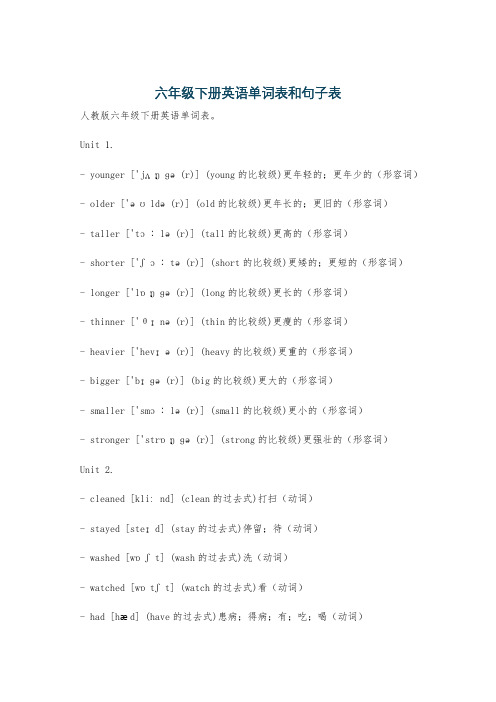
六年级下册英语单词表和句子表人教版六年级下册英语单词表。
Unit 1.- younger ['jʌŋɡə(r)] (young的比较级)更年轻的;更年少的(形容词)- older ['əʊldə(r)] (old的比较级)更年长的;更旧的(形容词)- taller ['tɔːlə(r)] (tall的比较级)更高的(形容词)- shorter ['ʃɔːtə(r)] (short的比较级)更矮的;更短的(形容词)- longer ['lɒŋɡə(r)] (long的比较级)更长的(形容词)- thinner ['θɪnə(r)] (thin的比较级)更瘦的(形容词)- heavier ['hevɪə(r)] (heavy的比较级)更重的(形容词)- bigger ['bɪɡə(r)] (big的比较级)更大的(形容词)- smaller ['smɔːlə(r)] (small的比较级)更小的(形容词)- stronger ['strɒŋɡə(r)] (strong的比较级)更强壮的(形容词)Unit 2.- cleaned [kliːnd] (clean的过去式)打扫(动词)- stayed [steɪd] (stay的过去式)停留;待(动词)- washed [wɒʃt] (wash的过去式)洗(动词)- watched [wɒtʃt] (watch的过去式)看(动词)- had [hæd] (have的过去式)患病;得病;有;吃;喝(动词)- had a cold感冒。
- slept [slept] (sleep的过去式)睡觉(动词)- read [red] (read的过去式)读;阅读(动词)- saw [sɔː] (see的过去式)看见(动词)- last [lɑːst] 最近的;上一个的(形容词);最后(副词)- yesterday ['jestədeɪ] 昨天(名词)- before [bɪ'fɔː(r)] 在……之前(介词、连词)Unit 3.- went [went] (go的过去式)去(动词)- camp [kæmp] 野营(动词、名词)- went camping去野营。
人教版PEP六年级英语下册小升初重点单词及短语复习资料

Unit1g e t up起床have breakfast吃早餐go t o school去上学School begins.开始上课have lunch吃午饭School is over放学go home回家have dinner吃晚饭watch TV看电视go t o bed睡觉breakfast早餐lunch午餐dinner晚餐cook breakfast做早餐teach English教英语take a walk散步read stories读故事walk走;步行every每一个morning早晨六年级上册单词表afternoon下午evening晚上;傍晚see a film看电影play the piano弹钢琴clean the window擦窗户clean the door擦门clean the floor擦地板often时常easy容易difficult困难Unit2collect toy cars搜集玩具汽车collect stamps搜集邮票collect maps搜集地图collect picture cards搜集图片open开;打开hobby爱好map地图box盒子colour颜色go fishing去钓鱼plant flowers种花cook meals做饭dad爸爸mum妈妈plant植物;种植flower花drink喝tea茶play computer games玩电脑游戏mak e dolls tak e pho t os照相photo照片kid小孩baby婴儿hungry饿的cry哭Unit3invite your friends t o your party 邀请朋友参加聚会celebrate your birthday with your friends与朋友庆祝生日time时间after在......后then那时me我(I的宾格)bye再见star-shaped cake星形蛋糕jelly果冻fruit pie水果派;水果馅饼kind种类chocolate巧克力ice cream冰激凌candy糖果sure当然light the candles点蜡烛sing the birthday so ng唱生日歌mak e a wish许愿blow out the candles吹蜡烛cut the cake切蛋糕eat the cake吃蛋糕here在这里for给;为了light点燃Unit4the first month of the year 一年里的第一个月the second month of the year 一年里的第二个月New Y ear's Day元旦Spring Festival春节January一月February二月back回原处;后面their他(她,它)们的the third month of the year 一年里的第三个月the fourth month of the year 一年里的第四个月T ree Planting Day植树节Easter复活节March三月April四月tree树;树木grass草;草地st op(使)停egg蛋;卵the fifth month of the year一年里的第五个月the sixth month of the year一年里的第六个月Labour Day劳动节May五月June六月M other’s Day母亲节Children’s Day儿童节Father’s Day父亲节hear d-shaped cake心形蛋糕give a birthday card t o your friend向朋友赠送生日礼Unit5the seventh month of the year一年里的第七个月the eighth month of the year一年里的第八个月the Party’s birthday党的生日Army Day建军节July七月August八月month月Dayyear 年the ninth month of the year 一年里的第九个月the tenth month of the year 一年里的第十个月 National Day 国庆节 September 九月 October 十月the eleventh month of the year 一年里的第十一个月the twelfth month of the year一年里的第十二个月Thanksgiving 感恩节 Christmas 圣诞节 November 十一月December 十二月Teacher’s 教师节Unit 6farm the land 种地;种田go on spring outgoings 去春游 fly kites 放风筝season 季节spring 春天little 一点green 绿色(的) bird 鸟 fly 飞go on a trip 去旅游go t o a summer camp 去夏令营 have summer holidays 过暑假 begin 开始 close 关;关闭 summer 夏天 weather 天气 heavy 重的 rain 雨;下雨 pick apples 摘苹果 cut rice 割稻子mak e a snowman 堆雪人 sweep the snow aut umn 秋天yellow 黄色(的)brown 棕色(的) white 白色(的) winter 冬天snowman 雪人六年级上册短语总结Unit11.be from/come from来自于20.have dinner吃晚餐2.Primary Six第六小学21.watch TV看电视3.Grade Six六年级22.for30minutes30分钟4.let sb do sth让某人做某事5.tell sb abo ut sth告诉某人关于某事6.tell sb t o do sth告诉某人做某事7.daily life日常生活8.ge t up起床9.in the morning在早上10.have breakfast吃早饭11.at six在六点钟at abo ut six在六点钟12.go t o school去学校13.School begins开始上课14.have seven subjects有七门课15.have lunch吃午餐16.at school在学校17.School is over放学18.in the afternoon在下午19.go home回家23.do some reading阅读24.go t o bed去睡觉25.How abo ut=w hat abo ut怎么样26.best wishes最好的祝愿27.be happy t o do sth高兴做某事28.get your email收到你的邮件29.in Grade Six在六年级30.an English teacher一位英语老师31.every morning每天早上32.cook breakfast做早饭33.go t o school去上学34.have four lessons a day一天有四节课35.learn English学英语36.by doing sth通过做某事37.play games玩游戏38.like sth very much非常喜欢某事39.cook dinner做晚餐40.after dinner晚饭 2.have a look看一看41.take a walk散步 3.open the box and see打开盒子看一看42.read sth t o sb读某东西给某人 4.What a super car!多棒的一辆小车啊!43.On Saturday每周六 5.collect stamps收集邮票44.see a film看电影 6.1)How abo u t you?你呢?45.have piano lessons上钢琴课46.It is adj t o do sth做某事是怎么样的47.help sb(to)do sth帮助某人做某事48.help sb with sth帮助某人某事49.practice doing sth练习做某事50.enjoy doing sth喜欢做某事51.at home在家52.do the housework做家务53.learn from sb向某人学习54.should do sth应该做某事55.teach English教英语56.read stories读故事57.clean the window擦窗户58.clean the door擦门59.clean the floor擦地板Unit21.a new toy car一辆新的小汽车2)How abo ut doing sth?做...怎么样?7.collect maps收集地图8.collect picture cards收集图片9.so colourful and beautiful如此多彩漂亮10.want t o do sth想要做某事11.look at看一看12.my family pho t o s我的全家福13.plant flowers种花14.drink Chinese tea喝中国茶15.That’s great那太棒了!16.That’s interesting那太有趣了!17.That’s wonderful那太棒了!18.look at this photo看这个照片19.in this photo在这个照片里20.at her birthday party在她的生日派对21.make a doll=mak e dolls做布娃娃22.be interested in sth对某事感兴趣d23.be interested in doing sth对做某事感兴趣much. 非常感谢5.would like t o do sth. = want t o do sth.24.play computer games 玩电脑游戏想要做某事25.take pho t o s 拍照片 6.my birthday party 我的生日聚会 26.two phot o s 两张照片 7.I ’ l ove to. 我愿意。
人教版六年级下册英语unit 1-4重点单词句子默写
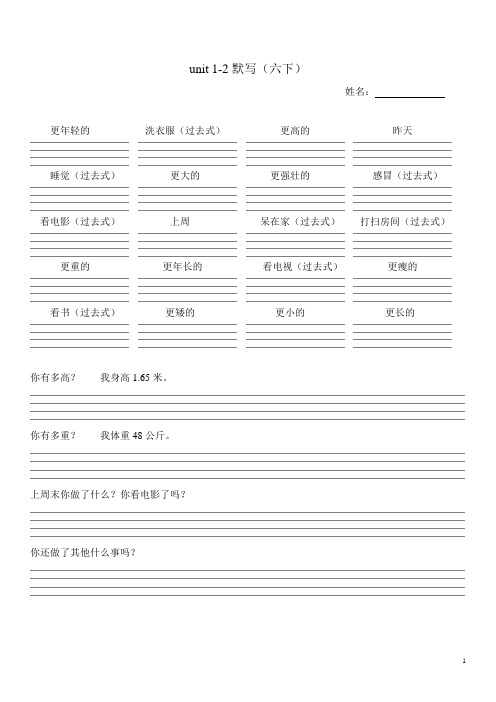
unit 1-2默写(六下)
姓名:更年轻的洗衣服(过去式)更高的昨天
睡觉(过去式)更大的更强壮的感冒(过去式)看电影(过去式)上周呆在家(过去式)打扫房间(过去式)更重的更年长的看电视(过去式)更瘦的看书(过去式)更矮的更小的更长的
你有多高?我身高1.65米。
你有多重?我体重48公斤。
上周末你做了什么?你看电影了吗?
你还做了其他什么事吗?
unit 3-4默写(六下)
姓名:
草坪去野营(过去式)体育馆滑冰
弄伤了我的脚(过去式)拍照(过去式)游泳(过去式)骑马(过去式)买礼物(过去式)去骑自行车打羽毛球骑自行车(过去式)去钓鱼(过去式)吃新鲜的食物(过去式)饭厅
怎么了?
你去哪儿了?我去了森林公园。
你们怎么去那的?我们坐飞机去的。
我以前的学校里没有图书馆。
你怎么知道的?。
人教版PEP版英语六年级下册第一单元重点知识集锦

PEP六年级下册单元重点知识集锦Unit1一.单词(教材54页Unit1,共计22个)二.短语1.how heavy多重2.what size什么尺码3.how tall多高4.both of us我们两个5.more dinosaurs更多的恐龙6.how old多大7.go shopping去购物8.go hiking去远足9.have a look at看一看10.think of想起11.any other任何其他的12.go on a trip to去旅行13.go down下沉、下降14.get lower and lower变得越来越低15.my shadow我的影子16.agree with同意17.talk about谈论18.have a try试一试19.an excellent goal keeper一个优秀的足球守门员20.need teamwork需要团结三.知识点1.how的用法(1)问身体健康等情况。
How are your parents?你父母身体好吗?How are things in your father’s factory?你爸爸厂里的情况怎么样?(2).问天气状况。
How is the weather today?今天天气怎么样?(3)询问方式。
How does your mother go to work every day?你妈妈每天怎么去上班?How can I carry the box upstairs?我怎样才能把这箱子搬到楼上呢?(4)询问程度。
How do you like this book?你觉得这本书怎么样?(5)How old问年龄、年代。
How old is your friend?你朋友多大了?How old is the bridge?这座桥有多少年代了?(6)How many问可数名词数量。
常将可数名词复数紧随其后。
如:How many pictures are there on the wall?墙上有多少幅画?How many glasses of milk would you like?你们想要几杯牛奶?(7).How much询问不可数名词的数量、物品的价格。
小学英语人教精通版六年级下册重点归纳

小学英语人教精通版六年级下册重点归纳第一单元Unit1 I went to Sanya for my holidays.重点单词:Sun 太阳moon月亮star星星Learn 学习;学到word 单词;词blackboard黑板say 说subject学科but 但是yesterday昨天why 为什么use用重点短语:1.by plane 乘飞机2.at night 在晚上3.at home 在家里4.a lot of 很多5.go to the beach 去沙滩6.do tasks 做任务7.act in drama 表演戏剧8.stay at home 待在家里9.have a party 聚会10.enjoy Spring Festive 过春节11.listen to music 听音乐12.speak English 讲英语13.read English 读英语14.write E n glish 写英语15.talk in English n用英语交谈16.play in English 用英语玩游戏17.enjoy sunbathing享受日光浴18.have an English party举办英语聚会19.enjoy the moon and stars看月亮和醒醒20.learn from each other 互相学习。
重点句型:1. We have learned a lot of English words我. 们学了很多英语单词。
2. We learned from each other我. 们互相学习。
2.What did you do for your holidays?你假期做了什么?3.I went to Sanya.我去了三亚。
4.We are very interested in English我. 们对英语很感兴趣。
5.How did you learn English?你(们)是怎么学英语的?6.We learned English by doing things我. 们通过做事情来学英语。
人教版英语六年级下册单词表及重点句型

人教版英语六年级下册单词表及重点句型全文共3篇示例,供读者参考篇1Mastering Vocabulary and Sentence Patterns: A Student's OdysseyAs a sixth-grader, the journey through the English textbook for Grade 6, Volume 2 (PEP Edition) has been nothing short of an adventure. Words and sentence patterns have become the keys to unlocking a world of expression and communication. Let me take you on a tour of this linguistic odyssey, where every page holds the promise of expanding our horizons.The Vocabulary VaultAh, the vocabulary list! A treasure trove of words that have become our constant companions. From the whimsical "fairy tale" to the awe-inspiring "planet," each term has opened our eyes to the richness of the English language. We've learned to wield words like "invention" and "scientist," empowering us to articulate our dreams and aspirations. And let's not forget the delightful "hobby," a term that has allowed us to express our passions and pastimes with newfound eloquence.But vocabulary alone does not paint the full picture. It's the nuances and connections that truly bring these words to life. Take the word "ocean," for instance. We've not only learned its definition but also its intricate relationship with terms like "wave," "beach," and "island." It's as if we've been given a map to navigate the vast expanse of the English language, with each word serving as a guiding star.The Sentence SymphonyIf words are the notes, then sentence patterns are the melodies that weave them together into harmonious compositions. We've been introduced to a symphony of structures, each one allowing us to express ourselves with precision and clarity.The simple present tense, for example, has become our faithful companion, enabling us to articulate our daily routines and habits. "I study English every day," we proclaim with confidence, showcasing our commitment to language learning. And when we venture into the realms of storytelling, the past tense becomes our trusted ally, transporting us to distant lands and bygone eras with phrases like "I visited my grandparents last summer."But our journey doesn't stop there. We've also mastered the art of asking questions, wielding the interrogative forms like seasoned explorers. "What do you like to do in your free time?" we inquire, eager to learn about the hobbies and interests of our peers. And when the occasion calls for it, we've even learned to express our desires and wishes with the sublime "would like to" structure, opening doors to new possibilities.The Tapestry of ExpressionAs we weave together these words and sentence patterns, a tapestry of expression unfolds before our eyes. We've learned to craft vivid descriptions, painting scenes with words that transport our audience to faraway lands or intricate mindscapes. "The majestic mountains stood tall, their peaks piercing the azure sky," we might say, evoking a sense of awe and wonder.But our linguistic prowess extends beyond mere description. We've also honed our ability to narrate stories, captivating our listeners with tales that span the breadth of human experience. "Once upon a time, in a village nestled among the rolling hills, there lived a young girl with a heart full of dreams," we might begin, setting the stage for an epic journey that will keep our audience spellbound.And let's not forget the art of persuasion. With the power of rhetorical questions and emphatic statements, we've learned to sway minds and ignite passions. "Isn't it time we took action to protect our planet?" we might ask, rallying our peers to join us in our noble cause.The Endless HorizonAs we stand at the precipice of this linguistic journey, we can't help but marvel at the expanse that lies ahead. The words and sentence patterns we've acquired are but a stepping stone, a foundation upon which we can build an ever-growing mastery of the English language.With each new chapter, we'll encounter fresh vocabulary and intricate sentence structures, expanding our linguistic repertoire and enabling us to express ourselves with unparalleled clarity and nuance. The world of communication will unfold before us, inviting us to explore its depths and scale its heights, all the while armed with the tools we've acquired through our diligent studies.So, fellow students, let us embrace this odyssey with open hearts and curious minds. For in the realm of language, the possibilities are endless, and the journey itself is the true reward. With every word we learn and every sentence pattern we master,we inch closer to becoming true masters of expression, capable of painting vibrant tapestries with the words that flow from our pens and tongues.Onward, my friends, for the adventure has only just begun!篇2Word List and Key Sentence Patterns from Grade 6 Volume 2As a sixth-grader, the second volume of our PEP English textbook is full of new words and grammar patterns to master. It can feel overwhelming at times, but I've found that breaking it down and practicing regularly helps a lot. Let me share the word list and key sentence patterns we need to learn.The word list is quite extensive, covering a wide range of topics. We have words related to animals like bear, deer, duck and owl. Then there are words about plants and nature like branch, forest, hill and root. Some new words describe feelings and emotions such as embarrassed, relieved, and confident. We also learn words for different occupations like artist, engineer, musician and scientist.Of course, no English word list is complete without common verbs like carry, catch, hang, throw and adjectives like amazing, electronic, serious, and traditional. There are also some quirkywords that I find fun to learn, like bungee, maze, and porridge. Learning their meanings and usage expands my vocabulary in an enjoyable way.Now, let's move on to the key sentence patterns we need to grasp. One important pattern is the use of modal verbs like can, could, may, might, must, should and would. For example, "You must be careful when crossing the road" or "She could play the piano very well." Understanding how to use these modals correctly is crucial.We also learn about forming questions using different question words like what, when, where, why, who, whose, which and how. Asking good questions is an essential skill, so practicing this pattern is very helpful. For instance, "What is your favorite subject?" or "How did you spend your weekend?"Another key pattern involves using conjunctions like because, but, so, or, and yet to connect ideas and form more complex sentences. This allows us to express thoughts in a more nuanced way, like "I wanted to go to the park, but it was raining heavily."Let's not forget about using relative pronouns like who, whose, which, and that to give more information about nouns.For example, "The book, which is on the table, is mine" or "The girl who won the race is my classmate."Mastering these patterns takes time and effort, but they are invaluable tools for communicating effectively in English. I try to practice them regularly by making up sentences, reading them aloud, and correcting myself when needed.Aside from the word list and grammar patterns, our textbook also introduces us to various text types like stories, dialogues, and informational passages. Analyzing the language used in these texts and understanding their structures helps improve our overall English comprehension.For instance, in a dialogue, we learn how to use expressions for making requests, giving advice, or expressing opinions. In a story, we observe how descriptive language is used to create vivid imagery and character development. And in an informational passage, we learn to identify main ideas, supporting details, and the author's purpose.Studying these different text types not only enhances our reading skills but also provides models for our own writing. We can learn how to structure a narrative, compose a persuasive essay, or draft a friendly letter.Overall, the word list and sentence patterns in our Grade 6 Volume 2 English textbook may seem daunting initially, but they are essential building blocks for improving our English proficiency. With consistent practice, patience, and a willingness to make mistakes and learn from them, we can gradually overcome the challenges and emerge as more confident and capable English learners.篇3Learning English vocabulary and sentence patterns can be quite a challenge, but it's an essential part of mastering the language. As a sixth-grader, I've been working my way through the PEP Edition Grade 6 Volume 2 English Textbook, and I must say, it's been an exciting journey of discovery.Let's start with the word list. It's an extensive collection of words that cover a wide range of topics, from everyday conversations to more complex themes like science, technology, and global issues. What I find particularly helpful is that these words are not just listed randomly; they're organized into units based on the themes explored in each lesson. This makes it easier for me to learn and remember the words in context.One of the units that really caught my attention was "The Internet." In today's digital age, understanding terms related to technology and the internet is crucial. Words like "website," "browser," "download," and "upload" have become part of our daily vocabulary. Learning their meanings and how to use them correctly has helped me communicate more effectively, especially when discussing online activities with my classmates and teachers.Another unit that I found fascinating was "The Environment." With increasing concerns about climate change and environmental issues, it's essential to have a solid grasp of related vocabulary. Words like "pollution," "greenhouse effect," "carbon footprint," and "renewable energy" have become more prevalent in our discussions. Understanding their meanings has not only expanded my vocabulary but has also heightened my awareness of the importance of environmental protection.Moving on to the sentence patterns, I must say, they're a game-changer when it comes to constructing meaningful and grammatically correct sentences. The textbook provides a comprehensive range of sentence structures, from simple to complex, covering various tenses, voices, and moods.One sentence pattern that has been particularly helpful is the use of adjective clauses. Sentences like "The book that I read last night was fascinating" or "The student who studies hard will succeed" have become much easier to construct and comprehend. These clauses add depth and detail to our sentences, making our communication more precise and engaging.Another sentence pattern that has caught my attention is the use of passive voice. While it may seem counterintuitive at first, sentences like "The book was written by a famous author" or "The experiment was conducted in a controlled environment" are incredibly useful in certain contexts, especially when discussing scientific or formal topics.Apart from the vocabulary and sentence patterns, the textbook also includes various exercises and activities that help reinforce our learning. From fill-in-the-blank exercises to writing prompts and comprehension questions, these activities ensure that we not only understand the concepts but also have opportunities to apply them in practical situations.One activity that I particularly enjoy is the role-playing scenarios. These scenarios encourage us to use the vocabulary and sentence patterns we've learned in simulated real-lifesituations. For instance, we might have to act out a conversation between a customer and a salesclerk, or a dialogue between two friends discussing their weekend plans. These activities not only make learning more engaging but also help us develop our confidence in using English in practical situations.Overall, the PEP Edition Grade 6 Volume 2 English Textbook has been an invaluable resource in my English language learning journey. The comprehensive word list and well-structured sentence patterns have provided me with a solid foundation for effective communication. As I continue to explore the remaining units and engage with the various exercises, I'm confident that my English proficiency will continue to grow, enabling me to express myself with greater clarity and fluency.。
六年级英语考试重点单词和句子

六年级下册重点必背英语单词六年级下册英语单词是学习英语必不可少的部分。
在这个阶段,学生需要巩固并扩大自己的英语词汇量,为高中或更高级别的英语学习做好准备。
下面将详细介绍六年级下册重点必背英语单词。
1. astronaut(n.宇航员)- a person who travels in space例句:Neil Armstrong was the first astronaut to walk on the moon.2. galaxy(n.星系)- a system of billions of stars, along with gas and dust, held together by gravitational attraction例句:The Milky Way is our galaxy.3. launch(v.发射)- to send an object into space or the air例句:They will launch a new satellite next week.4. explore(v.探索)- to travel around a place in order to learn about it例句:We explored the ancient ruins and discovered many interesting artifacts.5. orbit(n.轨道)- the path that an object follows as it goes around another object in space例句:The Earth orbits around the sun.6. solar(adj.太阳的)- relating to the sun例句:Solar energy can be used to power homes and buildings.7. satellite(n.卫星)- an object that is sent into space to revolve around the Earth, collect information, or communicate例句:The satellite provides images of the Earth's surface.8. astronautics(n.宇宙航空学)- the science and technology of space flight例句:He has a degree in astronautics.9. telescope(n.望远镜)- an optical instrument used to view distant objects 例句:He looked through the telescope and saw the stars.10. crater(n.火山口)- a large, bowl-shaped hole on the surface of a planet or moon, typically caused by an impact of a meteorite例句:The moon has many craters on its surface.11. universe(n.宇宙)- all existing matter and space considered as a whole;the cosmos例句:Scientists are still trying to understand the origins of the universe.12. meteor(n.流星)- a small body of matter from outer space that enters the Earth's atmosphere, becoming incandescent as a result of friction and appearing as a streak of light例句:We saw a shooting star, which is actually a meteor burning up in the Earth's atmosphere.13. gravity(n.重力)- the force that attracts objects toward each other, especially the force that attracts objects towards the center of the Earth例句:Gravity keeps us grounded to the Earth.14. alien(n.外星人)- a creature from outer space例句:In science fiction movies, aliens often visit Earth.15. exploration(n.探索)- the action of traveling in or through an unfamiliar area in order to learn about it例句:The team embarked on an exploration of the Amazon rainforest.16. mission(n.任务)- an important assignment carried out for a specific purpose例句:Their mission was to find a cure for the disease.17. module(n.舱段)- a self-contained unit or system within a larger system, often designed to be used in conjunction with other units例句:The lunar module landed safely on the moon.18. oxygen(n.氧气)- a colorless, odorless reactive gas that is necessary for respiration and exists as a diatomic molecule例句:We need oxygen to survive.19. atmosphere(n.大气层)- the envelope of gases surrounding the Earth or another planet例句:The atmosphere protects us from harmful radiation from the sun.20. discovery(n.发现)- the action or process of finding something new or previously unknown例句:The discovery of penicillin revolutionized medicine.21. equipment(n.设备)- the tools, machinery, and furniture needed for a particular activity or work例句:The scientists in the lab used various equipment to conduct their experiments.22. laboratory(n.实验室)- a room or building equipped for scientific research例句:She spent most of her time in the laboratory working on her thesis.23. experiment(n.实验)- a scientific procedure conducted to make a discovery or demonstrate a known fact例句:The teacher conducted an experiment to show how plants grow under different conditions.24. variable(n.变量)- a factor that can change in a mathematical orscientific study例句:Temperature is a variable that can affect the growth of plants.25. hypothesis(n.假设)- a proposed explanation for a phenomenon, often one that is based on limited evidence and subject to further investigation例句:The scientist formed a hypothesis and designed an experiment to test it.26. conclusion(n.结论)- the end or finish of an event, process, or text例句:After analyzing the data, the researchers drew the conclusion that the experiment was successful.27. evidence(n.证据)- facts or proof used to support a theory or argument例句:The fingerprints on the window were the evidence that led the police to the culprit.28. research(n.研究)- the activity of investigating a subject in detail例句:She is conducting research on the effects of climate change on local ecosystems.29. conclusion(n.结论)- the end result of a process of reasoning or a investigation例句:Based on the evidence, the court reached the conclusion that the defendant was guilty.30. theory(n.理论)- a set of principles or ideas intended to explain something, especially one that has been widely accepted例句:The theory of evolution explains how species change over time.31. innovation(n.创新)- the act or process of inventing or creating something new例句:The smartphone was a innovation that changed the way we communicate. 32. problem(n.问题)- a matter or situation that is causing difficulty, typically one that needs to be addressed or solved例句:The lack of access to clean water is a problem that affects many communities.33. solution(n.解决方案)- a way of solving a problem or dealing with a difficult situation例句:The engineers developed a solution to fix the malfunctioning equipment.34. challenge(n.挑战)- a task or situation that tests someone's skills, abilities, or endurance例句:Adapting to a new environment can be a challenge for some people.35. opportunity(n.机会)- a favorable or appropriate time or occasion例句:She seized the opportunity to further her education.36. challenge(n.挑战)- to demand effort or skill to accomplish something例句:The climb up the mountain was a real challenge.37. success(n.成功)- the achievement of something desired, planned, or attempted例句:Her hard work and determination led to her ultimate success.38. failure(n.失败)- the lack of success or the inability to achieve something例句:Every failure is a step towards success.39. effort(n.努力)- the exertion of energy to achieve a goal or complete a task例句:It takes a lot of effort to learn a new language.40.persistence(n.坚持)- the continued effort to achieve something despite difficulty or failure这些是六年级下册重点必背英语单词,通过学习和掌握这些词汇,学生可以更好地理解和使用英语,为进一步的学习打下坚实的基础。
人教版六年级下册英语知识点总结
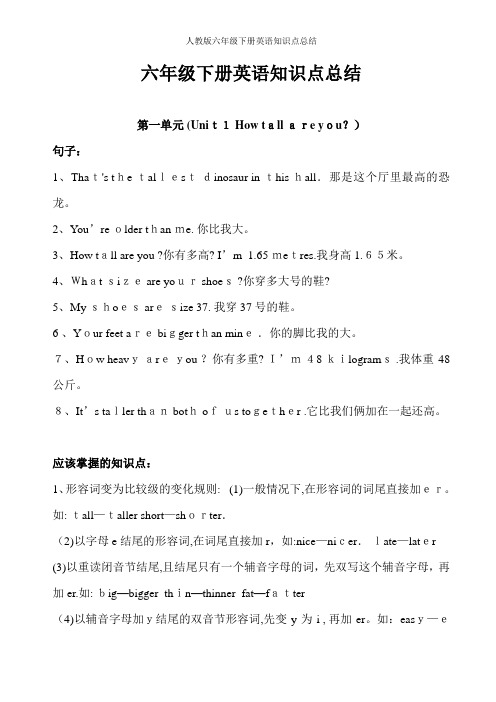
六年级下册英语知识点总结第一单元 (Unit1 How tall are you?)句子:1、That's the tallestdinosaur in this hall.那是这个厅里最高的恐龙。
2、You’re older than me. 你比我大。
3、How tall are you ?你有多高? I’m 1.65 metres.我身高1.65米。
4、What size are your shoes ?你穿多大号的鞋?5、My shoes aresize 37. 我穿37号的鞋。
6 、Your feet are bigger than mine.你的脚比我的大。
7、How heavyareyou ?你有多重? I’m48 kilograms .我体重48公斤。
8、It’s taller than both ofus together .它比我们俩加在一起还高。
应该掌握的知识点:1、形容词变为比较级的变化规则: (1)一般情况下,在形容词的词尾直接加er。
如: tall—taller short—shorter.(2)以字母e结尾的形容词,在词尾直接加r,如:nice—nicer.late—later (3)以重读闭音节结尾,且结尾只有一个辅音字母的词,先双写这个辅音字母,再加er.如: big—bigger thin—thinner fat—fatter(4)以辅音字母加y结尾的双音节形容词,先变y为i , 再加er。
如:easy—easier heavy—heavier funny—funnier.2、部分形容词比较级的不规则变化:good/well—better3、比较级的标志:than。
引导比较级的特殊疑问词:Which。
句子结构为:Which+名词+is+形容词比较级。
比较级+and+比较级表示:越来越……4、A与B比较的句子结构:A+be动词+形容词比较级+than+B.否定句句子结构:A+be动词+not+形容词比较级+than+B. 一般疑问句句子结构:Be动词+A +形容词比较级+than+B?A比B多多少的句子结构:A+be动词+数字+单位+形容词比较级+than+B。
人教版六年级英语各单元词汇及重点句子

新人教版六年級英語各單元詞彙及重點句子六上單詞Unit 1 How can I get there?science 科學museum博物館post office 郵局bookstore書店cinema電影院hospital 醫院crossing十字路口turn轉彎left左straight筆直地right右ask問sir先生interesting有趣的Italian義大利的restaurant餐館pizza比薩餅street街道get到達GPS 定位系統gave交給feature特點follow跟著far較遠的tell 告訴Unit2 Ways to go to schoolon foot 步行by乘法bus 公共汽車plane 飛機taxi計程車ship 船subway 地鐵train火車slow慢的down降低slow down慢下來stop停下Mrs 夫人early早到的helmet 頭盔must必須wear 戴attention 注意pay attention to 注意traffic 交通traffic lights 交通信號燈Munich 慕尼克Germany德國Alaska阿拉斯加州sled雪橇fast快的ferry輪渡Papa Westray帕帕韋斯特島Scotland 英格蘭Unit 3 My weekend planvisit拜訪film電影see a film看電影trip 旅行take a trip去旅行supermarket超市evening晚上tonight在晚上tomorrow 明天next week下周dictionary 詞典comic滑稽的comicbook 連環畫冊word 單詞word book單詞書postcard明信片lesson課space 太空travel 旅行half 一半price價格Mid Autumn Festival中秋節together 一起get together 聚會mooncake月餅poem 詩moon 月亮Unit4 I have a pen palstudies學習puzzle謎hiking遠足pen pal筆友hobby業餘愛好jasmine茉莉idea主意Canberra 坎培拉amazing 令人驚奇的shall 表示徵求意見goal 射門join 加入club 俱樂部share 分享Unit 5What does he do?factory 工廠worker 工人postman 郵遞員businessman 商人police officer 員警fisherman 漁民scientist 科學家pilot 飛行員coach 教練country 鄉下head teacher 校長sea 大海stay 保持university 大學gym 體育館if 如果reporter 記者use 使用type 打字quickly 快的secretary 秘書Unit 6 How do you feel?angry 生氣的afraid 害怕的sad 傷心的worried 擔心的happy 開心的see a doctor 看病wear 穿more 更多的deep 深的breath 呼吸take a deep breath 深呼吸count 數數count to ten 數到十chase 追mice 老鼠bad 壞的hurt 受傷ill 生病wrong 有毛病should 應該feel 感覺well 健康sit 坐grass 草坪hear 聽見ant 螞蟻worry 擔心stuck 陷住mud 泥pull 拉everyone 每人六上句子Unit 1 How can I get there?1. Where is the museum shop?博物館的商店在哪兒?2..It’s near the door.在大門附近。
- 1、下载文档前请自行甄别文档内容的完整性,平台不提供额外的编辑、内容补充、找答案等附加服务。
- 2、"仅部分预览"的文档,不可在线预览部分如存在完整性等问题,可反馈申请退款(可完整预览的文档不适用该条件!)。
- 3、如文档侵犯您的权益,请联系客服反馈,我们会尽快为您处理(人工客服工作时间:9:00-18:30)。
三年级上册单词黑体字(73个单词)pen pencil pencil-case book bagruler eraser crayon sharpener schoolhead face nose mouth eye ear arm hand finger leg foot bodyred yellow green blue purple white black orange pink browncat dog monkey panda rabbit ducksquirrel mouse elephant pig bird bearcake bread hot dog hamburger chicken French friesCoke juice milk water tea coffeeone two three four five six seven eight nine ten doll ball boat kite balloon car plane三年级下册单词黑体字(72个单词、词组)boy girl teacher student this my friend nice good morning Good afternoon meet goodbye tooI’m=Iamfather dad mother mom man woman grandmother grandma grandfather grandpa sister brother let’s=let us really great and how eleven twelve thirteen fourteen fifteen sixteen seventeen eighteennineteen twenty how many can look atpeach pear orange watermelon apple banana grape strawberry like som e thanks bus bike taxi jeepdesk chair walkman lamp your zoosmall big long short tall giraffe deer 四年级上册单词黑体字(66个单词、词组)window board light picture doorfloor classroom computer wall fan teacher’s desk Chinese book English book math book schoolbag story-book notebook twenty-one thirty thirty-one forty forty-one fifty long hair shorthair thin strong quiet friend(s) music science sports computergame paintingstudy bathroom bedroom living kitchen phone bed sofa shelf fr idge table rice fish noodles beef vegetable soup knife chopsticks spoon plate forkfamily parents uncle aunt baby driver doctor farmer nurse base ball player四会单词(36个)bag pencil pen book ruler pencil-caseteacher student boy girl friendhome room school classroom window desk door chair bed rice beef bread milk egg waterchicken fishsister brother father motherdriver doctor farmer nurse四年级下册单词黑体词(50个单词、词组)playground garden teacher’s desk canteen art room computerroom washroom music roomgym TV room lunch English class music class breakfast dinner P.E. class getup go to school go home go to bed sweater jeans pants socks shoes shortshot weather rainy windy cloudy colourful pretty cheap expensive s neakersslippers sandals boots sheep hen lamb goat cow tomato cucumber potato onion carrot四会单词(88个)computer board fan light this is my that your teacher’sdesk picture wall floor yes itone two three four five six seven eightnine ten what time it’s o’clock mathChinese English P.E. music for classjacket shirt skirt dress T-shirt redblue yellow green white no not colourwarm cold cool today jeans pant socksshoes let’s play football snowy sunny howmuch big small long short applebanana pear orange watermelon are theyhorse aren’t cat rabbit pig duck dogeleven twelve thirteen fifteen twenty how many there五年级上册单词黑体字(16个单词、词组)principal university student cabbage pork mutton empty the trash put away the clothes air-conditioner over in front of sky cloud mountainvillage city四会单词、词组(93个)young funny tall strong kind old short thin who’s=whois Mr what’s=what is like he’s=he is strict smart active quiet she’s=she is very but Monday Tuesday Wednesday Thursday Fridayday have on Saturday Sunday do homework watch TV read books What about…? too eggplant fish greenbeans tofu potato tomato for lunch we tasty sweet sour fresh saltyfavourite they’re=they are fruit don’t=do not grape cook the meals water the flowerssweep the floor clean the bedroom make the bed set the table wash the clothes do the dishes can’t=cannot use a computer curtain trashbin closet mirror end table bedroom kitchen bathroom livingroom in on under near behind clothes riverflower grass lake forest path parkpicture house bridge tree road building clean五年级下册单词黑体字(18个)January February March April May JuneJuly August September October NovemberDecember first second third fourth fifth Eighth ninth twelfth twentieth四会单词、词组(83个)do morning exercises eat breakfast have English class play sports eatdinner when eveningget up at usually noon climb mountains go shopping play the piano visit grandparentsgo hiking weekend often sometimes spring summer fall winterseason which best swimfly kites skate make a snowman plant trees why because sleepJan. Feb. Mar. Apr. May June July Aug.Sept. Oct. Nov. Dec. birthday uncle her datedraw pictures cook dinner read a book answer the phone listen tomusic clean the roomwrite a letter write an e-mail mom grandpa studyfly jump walk run swim kangaroosleep climb fight swing drink water take pictures watch insects pick up leavesdo an experiment catch butterflies honey count insects collect leaves write a reportplay chess have a picnic六年级上册单词黑体字(16个)plane ship subway science museum northsouth east west tonight tomorrowtake a trip read a magazine go to the cinema magazine dictionary vapour四会单词、词组(71个)by foot bike bus train how go to school traffic traffic light trafficrule stop wait get to library post office hospital cinema bookstorewhere please nest to turn right left straight then next week thismorning this afternoon this evening comic book post card newspaper buyhobby ride a bike dive play the violin make kites collectstamps live(s) teach(es) go(es) watch(es) read(s) does doesn’t=doesnot singer writer actor actressartist TV reporter engineer accountant policeman salesperson cleanerwhere work raincloud sun stream seed come from soil sprout plant should then六年级下册单词四会单词(25个)taller shorter stronger older younger biggerheavier longer thinner smaller have a fever hurt have a cold have a toothache have a headache have a sore throat matter sorenose tired excited angry happy bored sad三年级上册句子读下列句子,写出中文意思.1. Hello! ___________ Hi! _____________________________2. Hello! I’m Wu Yifan. I’m from China.__________________________3. What’s your name?_______________________________________4. My name’s Chen Jie. ______________________________________5. I have a pencil. ____________________ Me too._________________6. Good morning._______________ Good afternoon._______________7. This is Miss White. _____________Nice to meet you. ____________8. Where are you from? ____________ I’m from America.___________9. Let’s go to school. __________________ OK.________10. . How many cakes? ____________________One cake.__________11. How are you? ________________I’m fine, thank you._____________12. Let’s paint. _________________ Great.________________________13. I like green._________________ Me too. ______________________14. I have a rabbit. ___________________________________________15. Cool! ________ Super!_________ Great!________ Wow!_________16. May I have a look? ___________________Sure. _________________17. Here you are. _________Thank you. __________You’re welcome18. I like hamburgers._______________ Me too. ___________________19. Have some French fries. ____________________________________20. Can I have some chicken? ____________________Sure. __________21. How old are you? ____________________ I’m nine. ____________三年级下册句子1. Where are you from? I’m from America.2. Good morning! Good afternoon!3. Class, we have a new friend today.4. Who’s that woman?She’s my mother。
